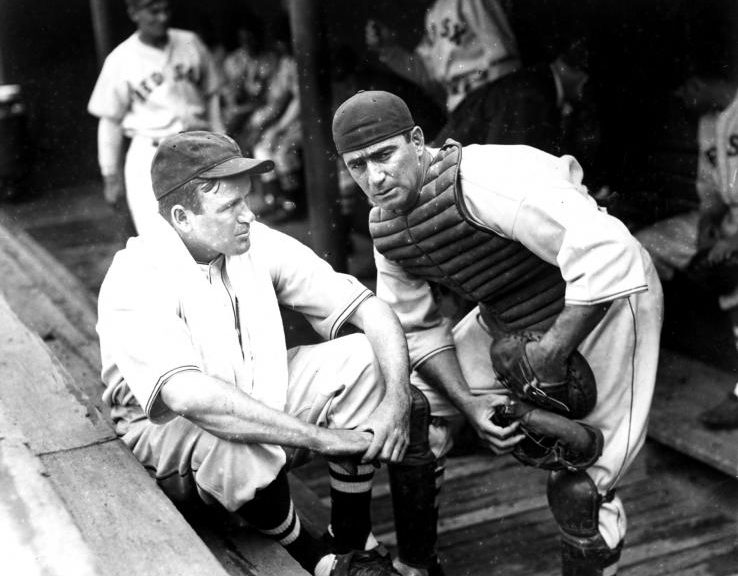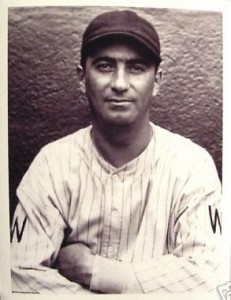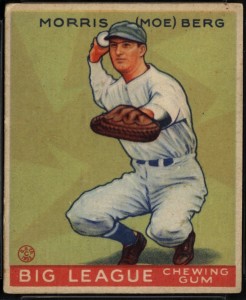
Moe Berg: “Give My Regards to the Catcher” —Franklin Roosevelt
Q: The Catcher was a Spy
In The Catcher was a Spy (1994), Nicholas Dawidoff tells an incredible story. Back in the 1930s, Moe Berg’s intellectual prowess was well-known to baseball fans—he was a major leaguer from 1923 to 1939, mostly a catcher.
During World War II, he parachuted into Yugoslavia to assess the value to the war effort of the two groups of partisans. He reported that Marshal Tito‘s forces were widely supported by the people and Winston Churchill ordered all-out support for Tito rather than Mihailovic‘s Serbians. Later (under the code name “Remus”)
Berg was sent to Switzerland to hear a lecture by German physicist Werner Heisenberg, and determine if the Nazis were close to an atomic bomb. Moe slipped past SS guards at the auditorium, posing as a Swiss graduate student, carrying a pistol and a cyanide pill. If Heisenberg indicated the Nazis were close to a bomb, Berg was to shoot him, and then swallow the cyanide pill.
Convinced finally that the Germans were nowhere near their goal, he complimented Heisenberg on his speech and walked him back to his hotel. Berg’s report was distributed to Prime Minister Churchill, President Roosevelt and key figures in the Manhattan Project. Roosevelt allegedly responded: “Give my regards to the catcher.”
Is somebody pulling our leg? Churchill and his biographers make no mention of Moe Berg. Does anyone know of a reputable historian who supports these stories? I’m a great believer in footnoting sources. —J.P., Toronto
Who was Moe Berg?

I guess we’ll pardon a Blue Jays fan for not knowing about Moe Berg. Any red-blooded Washington Senators (er, Nationals) fan knows all about him—the smartest guy ever to play major league baseball, and a war hero and atomic spy to boot. Churchill might have avoided mention of Berg in his memoirs because of U.S. secrecy considerations.
Moe Berg was back-up catcher for the powerful Washington Senators teams of 1932-34, including the 1933 pennant winners. They were managed in 1932 by the immortal Walter Johnson, but owner Clark Griffith let Walter go in 1932 (after asking his permission!)
In 1935 Griff released another Hall of Famer, Joe Cronin, who was player-manager. Cronin later became a legend with the Boston Red Sox. Berg joined Cronin there from 1935 to 1939.
His teams never had much offense from Moe, who hit .243 career, but he was a superior defensive catcher who knew how to call a game with his pitchers, and had a powerful arm which discouraged base-stealers. But the Senators’ “clown prince,” coach Al Schacht, nevertheless called him “just an educated imbecile.”
He couldn’t hit the curveball
Casey Stengel was still playing for the New York Giants when Moe broke in with the Brooklyn Robins (later Dodgers) in 1923. Case said Berg was “just about the strangest bird” he’d ever come across. Moe was an alumnus of three universities, a lawyer, mathematician and linguist. He reputedly spoke seventeen languages. At Princeton, he wrote reviews of plays in Sanskrit!
 His teammates said that while he could speak in many languages, he could hit in none. “Moe,” said White Sox catcher Buck Crouse, “I don’t care how many of them college degrees you got. They ain’t learned you to hit that curveball no better than me.”
His teammates said that while he could speak in many languages, he could hit in none. “Moe,” said White Sox catcher Buck Crouse, “I don’t care how many of them college degrees you got. They ain’t learned you to hit that curveball no better than me.”
DeVeaux on Berg
Here’s your footnote. Tom DeVeaux in The Washington Senators 1901-1971, p112:
His eccentricities aside, Berg would eventually become one of America’s most important atomic spies. Teams of major leaguers visited Japan in the early Thirties. Some fans were amazed that a third-string catcher like Berg was sent along. He was actually there to take photos for the government. During World War II he joined the OSS, forerunner of the CIA. He was parachuted behind enemy lines to kidnap atomic scientists and bring them back to America.
For his heroism, Berg was to have been award the Medal of Merit, but he turned it down. He was dark and highly refined in manner, attractive in the eyes of ladies. Berg was also honorable and forthright when someone suggested that he was wasting his intellect on baseball. He always answered what the most bright-eyed of American youths would have—that he would rather be a ballplayer than a U.S. Supreme Court Justice.
Berg’s medal was accepted posthumously by his sister and now hangs in the Baseball Hall of Fame in Cooperstown. To know this stuff you have to be a baseball fan….







7 thoughts on “Moe Berg: “Give My Regards to the Catcher” —Franklin Roosevelt”
Thank GOD he was on our side!
Right, Washington could use a .243 guy behind the plate today!
My dad, Bill Trotter, played against Moe in the 1930s in the American League. Always said he couldn’t hit but was a fine receiver and carried the Sunday New York Times around all week. A back up catcher who bats .243 would not be bad these days.
Phil Gefsky (below): Looks like a film is coming this year. https://cieslafoundation.org/moe-berg-2018/
Absolutely right. Good catch. Photo replaced. I only got one of them college degrees. BTW it’s Glenn Miller.
I don’t care how many of them college degress [sic] you’ve got- that ain’t Moe Berg- it’s Glen [sic] Miller!
Hollywood should make film about this unusual but great and heroic American Moe Berg.
Comments are closed.